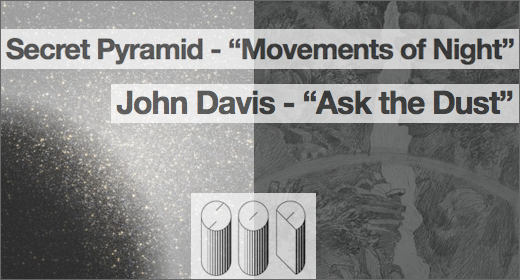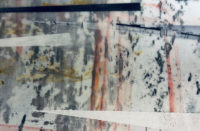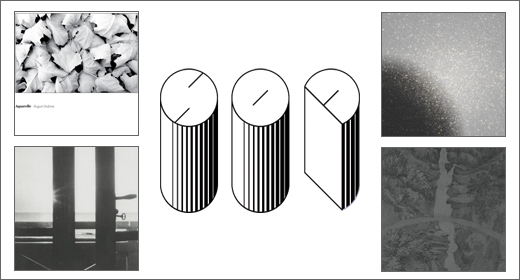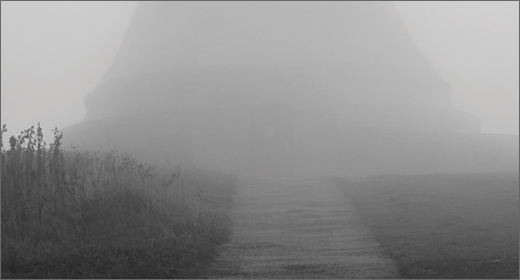A major vector in the trajectory of West Coast US ambient/drone for nearly a decade, Students of Decay quietly brought up a century of releases in late 2013 with two new ‘graduates’ (pre-‘viewed here)—Vancouver mover Secret Pyramid and Californian dreamer John Davis.
For an unfamiliar name, with only some small acclaim (that for The Silent March, a cassette-only release since cued by SoD for a 2014 vinyl reissue), the sureness of touch and voice shown by Amir Abbey on his Secret Pyramid release, Movements of Night, is striking. Right from opener “A Descent,” which has drawn-out tones seep out from behind a tape hiss-blurred wall of sleep in nebulous sequences mounting over an insistent heartbeat pound, he deftly documents the depths of (un)consciousness; vaporous chords well up in the interstices between the drone mist from guitar swirl and piano chord treatments, accruing low-end weight and high-end stretch. Kranky types may feel a rough familiarity in Abbey’s drone tracts, nested as they are on post-rock inflected progressions (a line from Labradford via Stars Of The Lid, even GYBE!, to Tim Hecker), taking from the quiet-loud dynamic in these makeovers of treated guitars and keyboard sustains, reverb-drenched chord recursions, harmonic undertones zoomed in on, looped, time-stretched, and held up to the (darkened) light. “Quiet Sky” comes in similar slow-mo minor-key swells, a swirl of string-driven things mounting then falling back into sublimated smears. “Closer” slings the wooze, plumbing deeper drone zones, seguing to the more elegiac dark-light of “To Forget,” a luminal blur of wordless vox/guitar/static, liminal bass pulsing and prompting. Float in the fields of feedback fuzz of “Wish,” then plunge into the organ submersions of “Depths,” which glowers from beneath the susurrating patina enshrouding its strings, wordless vocals and guitar shards. Then on to “Move Through Night,” a forlorn guitar strum echoing forlornly over a spectral piano motif, slowly mounting in glacial cadence. “To Forget” emerges from the haze and occluded melody of “Closer” into a more palpable moodscape, a mellifluous flow populated with Popol Vuh ghosts before the final “Escape (Fade Out)” brings beauteous resolution with softly creeping Rhodes, fizz and glare muted and shaded to show the lovely bones below. A brooding prevails, with a transcendent sense securing against the maudlin or morose. Overall, Abbey maneuvres the nocturnal hum from a somnific remove, marking Movements of Night with a sense of depth and space, an expanse wherein the listener can enter and simply sprawl, washed in waves of harmonized static.
John Davis is a less lowlight name inhabiting the West Coast US ambient-drone/psych underground, whose previous works on Root Strata, Digitalis and Peasant Magik point to strong linkages between his music and his work in film and media, explorations of nature and live improvisations. A set wrought with modular synthesis and guitar, piano and tape loops, Max/MSP tweaks and field recording infusions, Ask the Dust may bear the trappings of ambient, but its initial soft sounding surface belies more uneasy listening. Davis deals in shifting soundscapes with a tendency to defeat expectancies mid-phase, ever-mutable, emerging, sometimes jarring, queasy, sometimes a great notion. “Superpartner” sets the tone with skittish sonorities, particulate detail accruing via treated guitar—e-bowed strings, synth sweeps, captured environmentalia and percussives colluding in Davis’s mesmeric agenda. It traverses fast-paced shifts in tone and timbre over its course, flirting with prettiness, colluding in ludic heuristics, a rapture of metals and sample buzz-and-flutter teeming through it. “Joy Meridian” densifies over oscillating pads, distorted synth harmonics conspiring in a filter’n’flange fest. “Palestrina” lays a lush mulch for a host of skip, stutter, synth-swell and vibrant sample fare to grow in, multiply-voiced as if to mirror the eponymous 16th c. composer’s polyphonic prowess. Then centrepiece “Synecdoche” initiates in an ill-advised neo-classical solemnity of chamber piano plonk, soon gratifyingly dispelled by darker intimations; a euphonic clangor of layered sine waves and guitar haze—a celestial swell gradually destabilized by low-end throb, inkier oceans of dissonance, industrial scrapes blooming beguilingly, twinklingly treated. “Julian Wind” brings things to a close in field textures, down-tuned synth and an eerie mélange of reverberating chimes fading out to a regressive hypnosis session sample. Ultimately, there’s a sense of constant flux and porosity that at times feels somewhat dissipative—no fixed reference, stable sequence or focus, a suture of vignettes more than stronger sustained structures, a fata morgana rather than a fully-formed entity. But for all that Ask the Dust leaves a feeling that greater reward might have come had more room been left for its elements to linger longer with the listener, John Davis is to be lauded for the unpredictability and challenge of what is an always interesting listen.
Movements of Night and Ask the Dust are available on Students of Decay.


























